Unless You're Famous Don't Bother Writing About Yourself
obscurity never goes out of fashion

Whether you’re a street busker, YouTube star, or singing in the shower anything can happen in rock n roll.
Sometimes I made a lot of money and most times nothing. I still earn royalties for projects 45 years ago.
Rejected sure, but never bored!
It's a trial for musicians and the behind-the-scenes music-biz shakers to try and write their bio. Without the benefit of a hit song or affiliated with a well-known name most will skip it. The question is one more of honesty, versus relevancy, and without the latter why bother?
I will attempt to avoid the pitfalls of writing the melodramatic tic bio. The one that is too long and prone to include details is best highlighted in a Forest Gump sequel.
To curb my indulgences, I will drop the pronoun I. And deep dive into 3rd person and pretend Jon Bream, the Music Critic for the Minneapolis Star & Tribune will publish this for my obituary.
Hennings is not famous so let's skip his first instrument. The first record that blew his cork and like most aspiring Boomer rockers how watching the Beatles on Ed Sullivan changed his life.
Back in 1968, the 19-year-old owner of the Prison Dance Hall gave the 14-year-old Hennings his first job in the music biz. And, until he couldn't count the change back, sold pop, checked coats, and took door fees.
The job was a doorway into the music business. He met most of local music stars of the time, a few national like 3 Dog Night, and their agents and managers.
The business of being paid to party looked easy from Hennings' vantage point--the venue sold out, the show was over, and the band got paid.
Woodstock was his next music business education.
The event had shown him more than any other music festival of the time, the possibilities of bringing together people through music.
Raising social awareness and creating personal harmony through music grabbed him. Idealistic, but it became his lifelong mojo.
Somewhere between the next 55 jobs, he kept playing guitar and dreaming.
In his hometown of Minneapolis, disco fever finally ran its course, cooled off, and died out by 1979. Festering beneath the mainstream the influence of punk and new wave music grew.
Hennings didn't grasp the raw edge, back-to-the-rock basics of punk's three-chord guitar style, and stage flair that favored personality over ability.
But the energy, rebelliousness, and spirit of the sound hooked him. Then, catching the new wave, he finally plugged back into his music.
With the explosive success of Prince, Minneapolis became a great spawning ground for new music. The music scene became known in the press as the "Minneapolis Sound."
Nicknamed the "third coast," and the "Nashville of the North," the Minneapolis music scene exploded into an impressive underground economy. It consisted of hundreds of clubs, bands, agents, studios, managers, distribution, and record companies.
Hennings worked with many.
In 1979 Hennings started a local band called Vitamin Q. He played lead guitar during its five-year run. Playing new wave hits of the era and a few originals, the band became a popular act in areas of the Midwest.
It was one of the first bands to play the legendary Jay's Longhorn. Vitamin Q's original claim to fame came from Hennings' song "Me Magazine." In 1981, the song appeared on the "Best of the Twin Cities Beat" album and TV show.
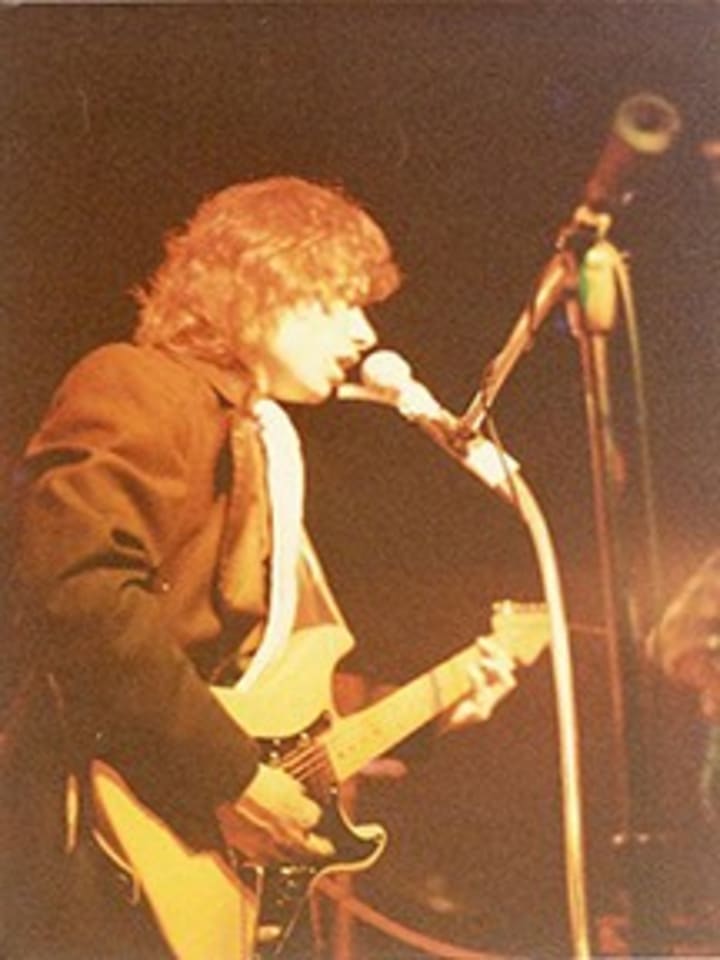
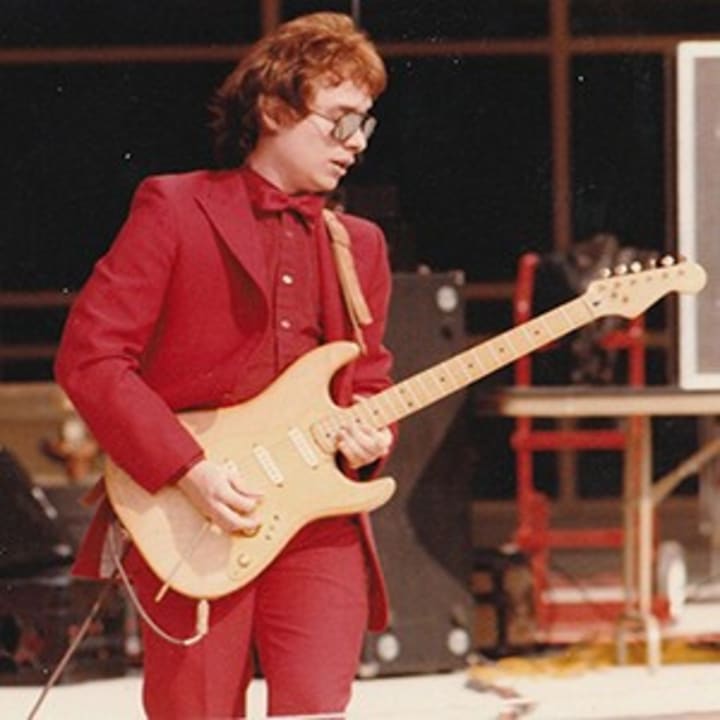
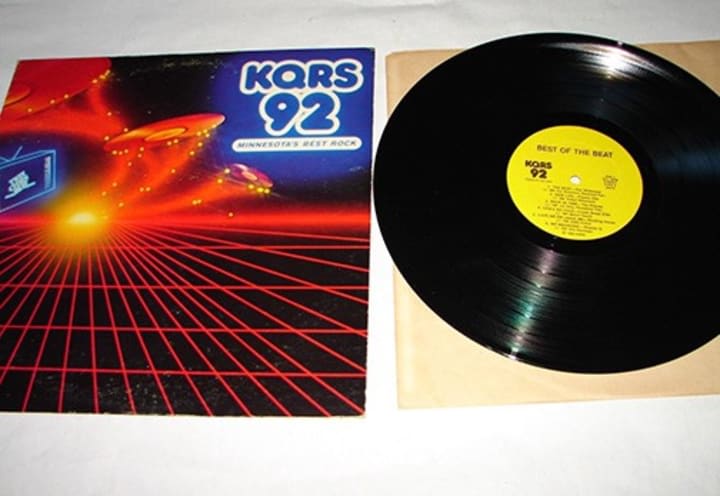
Pulling on experience from his rock festival days, Hennings helped to transform the group's warehouse space into a concert hall. The space provided free access to original groups. The space became known as "On Broadway." It gained recognition as a critical spawning ground for developing talent.
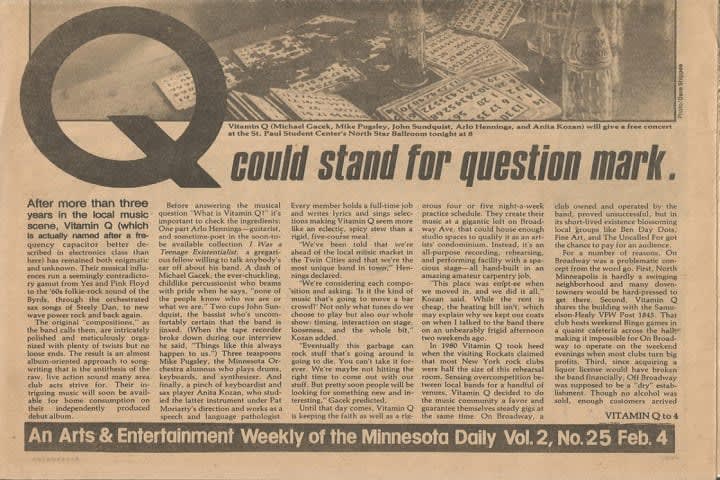
In 1981, the D'Art Magazine, Minnesota Daily, Vol. 2, №25, Feb 4, published a feature article on the venue called, "Q Could Stand for Question Mark.
In the 80s, in the Wedge neighborhood, Hennings had an 8-track recording studio. He lent a hand to artists to provide opportunities for those less gifted in carving a niche for themselves, which helped to preserve fine expressions of the spirit calling unto itself.
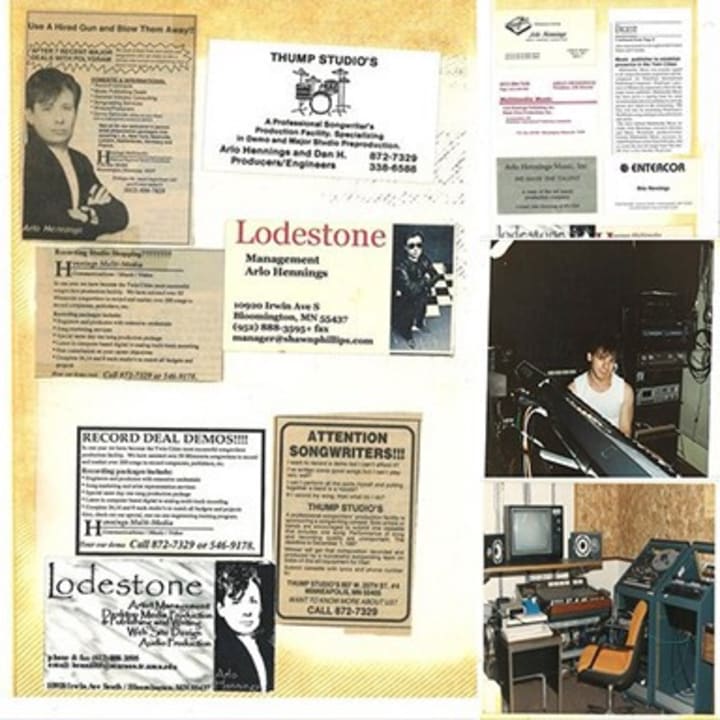
Among the top you-never-heard-of-it, Hennings recorded a double album and a 40-page libretto, Burden of the Beat: The Eyelid Movie - a project that parodied wanting to be a rock star.
The Minnesota Historical Society documented the work (AV collection disc #175-A). The Plains Art Museum in Moorhead, Minnesota, gave the grant to exhibit the multimedia piece. The Minneapolis Star Tribune and Saint Paul Pioneer Press nominated the work for their top 10 picks of that year.
In 1986, Hennings became the sales manager for Mill City record distributors. As the sales manager, he promoted and distributed over 100 national and local independent labels. Including, a fledgling new label, owned by school teacher turned music entrepreneur Bob Feldman. Feldman named the label Red House after his house. Red House Records became one of the most famous folk labels in America. Feldman called Hennings daily for reassurance on his first releases.
In 1989, believing in the commercial potential of several Minneapolis songwriters Hennings shopped their music to Los Angeles record companies. With no connections, a $500 limit VISA card, months behind on his $350 per month rent, and a car borrowed from his dad, he banged on the doors of Hollywood for months.
Finally, the President of PolyGram International Music Publishing liked what he heard. Hennings signed his company to a production/publishing deal. It was his first major success story in the music business.
From a dance hall coat check boy to a music industry executive, the St. Paul Pioneer Press ran a feature on his accomplishment.
The press called it one of the most significant boons to happen to the Minneapolis music scene. His contract stipulated that he was to find and develop talent who could produce tomorrow's hits--A&R man (talent scout).
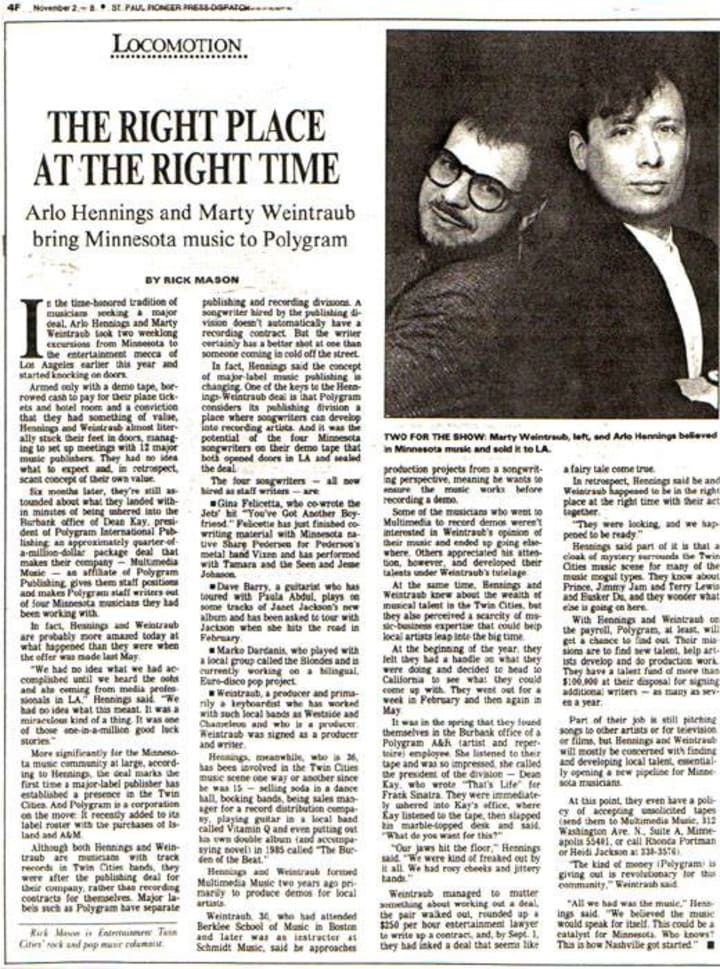
Hennings moved into former Prince’s manager, Owen Husney's office. During his time as co-publisher and A&R man, Hennings placed several artists on major labels. He also helped the indie label Twin Tone Records with finding a new distribution deal with Restless Records and avoided bankruptcy.
Hennings filled local attorney offices and recording studios with his business.
In 1990, the Minnesota Music Academy asked him to present the Artist of the Year Award--Ann Reed, Red House Records winner.
In 1991, the record labels Capitol, Decca, Def Jam, Deutsche Grammophon, Interscope, Island, Motown, Polydor, Republic, Virgin, and EMI merged into one monster.
The conglomeration became Universal Music (UMG) the largest monopoly on creativity. Universal controlled the markets, distribution, radio, media, venues, and worse they shaped pop culture.
Driving the proverbial rock n roll nail into the music coffin, LIVE NATION and TICKET MASTER merged and controlled the venue business. And (4) media giants bought up the radio.
The day of the INDIE was dead.
If you weren't part of the new music mafia your chances for success in the music business went from not promising to nil. The one thing they wouldn't be able to control was Prince.
The Minneapolis Sound that set the charts on fire and sparked a lasting effect on songwriting ended in one, long, sustained Dove cry. Prince who became the artist "formerly known as Prince," died on April 21, 2016. With him died countless parties, deals, hopes, songs, and groundbreaking videos. With the collapse of the purple wave, the candle of the '80s Minneapolis music scene was snuffed out.
The wave of change didn't spare Hennings. In 1992, his contract with PolyGram ended.
Hang in there. It’s nearing the end.
Twin Tone Records shuttered its doors, and bands broke up like The Suburbs, Replacements, and Husker Du. The famous venue First Avenue fought to stay open. The Longhorn and Duffy's closed. Flyte Tyme flew away and many others throughout the music eco-chain. Except for a couple of major label signings in the early 90s, the Minneapolis Sound had peaked.
He tried to remain relevant with several local music business start-ups. He tried many things like writing the music business curriculum for a music school.
Hennings did not lose sight of his original Woodstock dream. To raise social awareness and create interpersonal harmony through music, there would be more songs and other artists.
The drum would beat again but, for how long, and where would he have to go to find it?
Starting over included earning a 4-year music business-based Baccalaureate of Arts degree and a Master’s Degree in writing.
He moved from his ratty, but historic, one-bedroom recording studio apartment. His first child in tow put Nashville PolyGram Music out of reach. He held his life together by working various dead-end jobs again. He will never forget the one night, as a limousine driver, he drove Prince and Carmen Elektra to First Avenue.
In 1994, Hennings met Shawn Phillips at the Fineline Music Café and became his manager for 18 years.
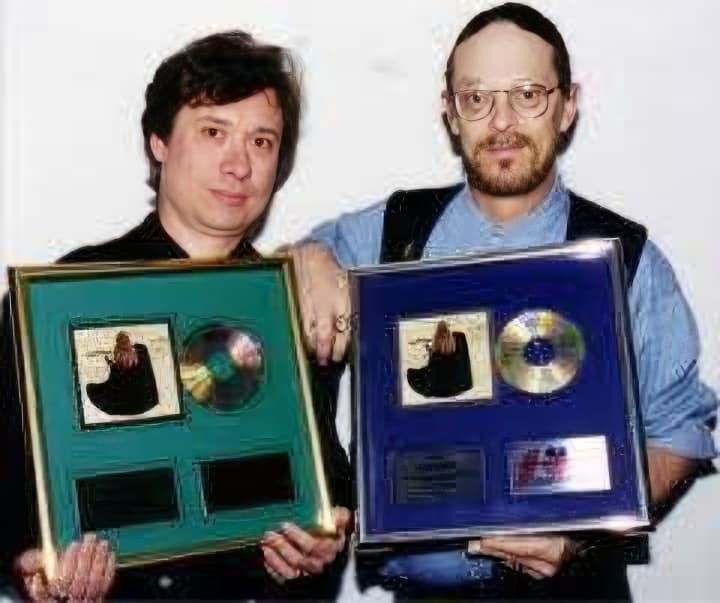
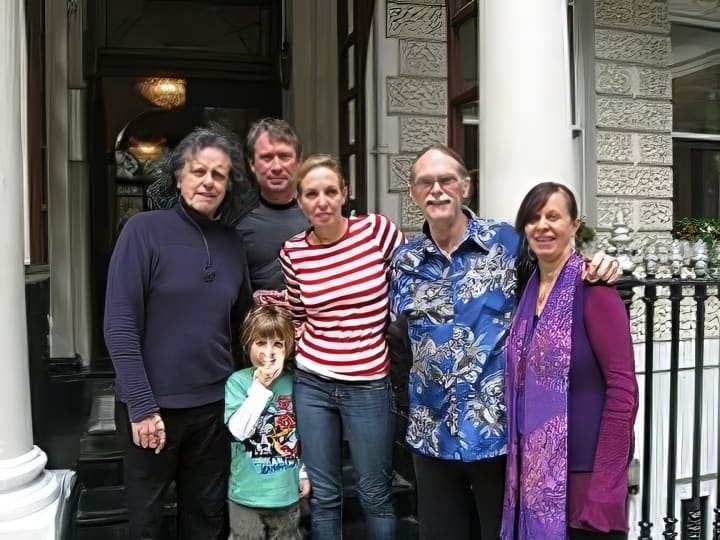
Perhaps Hennings crowning achievement in the music business was supporting South Africa to end Apartheid. In 1994, he toured the country with Shawn Phillips on the eve of Nelson Mandela’s election.
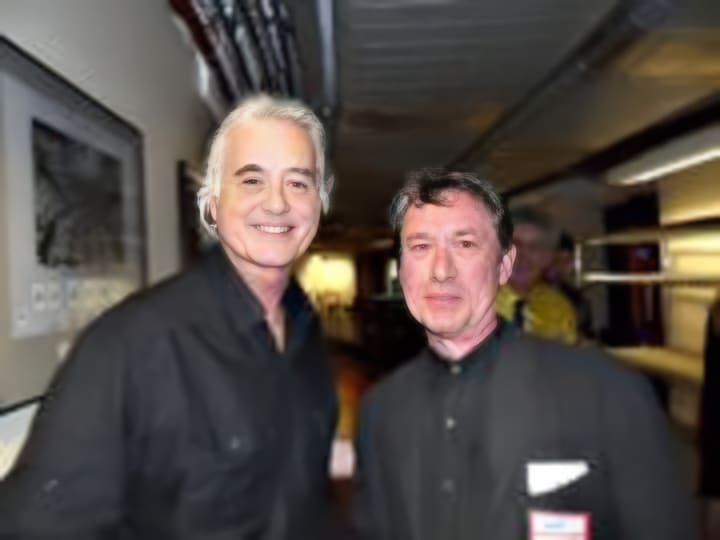
Shawn Phillips and Hennings ended their relationship in 2013.
What Hennings does best is help create and nurture music scenes. Minneapolis had run its course and he looked for another place to inject his mojo.
He found it halfway around the world in Indonesia.
In 2011, Hennings packed up and moved to Bali.
What he accomplished there is unusual considering he didn’t know the language. Outside of Indonesia, not many will get it. However, recognition is not what drives Hennings—the Woodstock thing does.
His deeds were published in Indonesian media outlets such as the Bali Advertiser, Tirto, and the Indonesian Expat Magazine.
His music contributions were centralized on his Indonesian Jazz label (Indojazzia). Under his tutelage, it landed a young pianist from Bali, Eric Sondhy, on the worldwide music charts.
He was a curator for the music podcast show 107.3 2Ser Australia, which featured Indonesian music.
The first foreigner to participate in the Indonesian Music Awards (AMI) and a business consultant for the indie label MoonJune.
Hennings also managed the International Indonesian band, I Know You Well Miss Clara.
Finally, he was the Director of Business Development for the Ubud Concert Series and the Indonesian Music Expo (IMEX).
In 2016 Hennings published a memoir called "Guitarlo" and in 2022 the book “Solo-10 Years in Bali.”
Where does he go from here?
About the Creator
Arlo Hennings
Author 2 non-fiction books, music publisher, expat, father, cultural ambassador, PhD, MFA (Creative Writing), B.A.






Comments
There are no comments for this story
Be the first to respond and start the conversation.